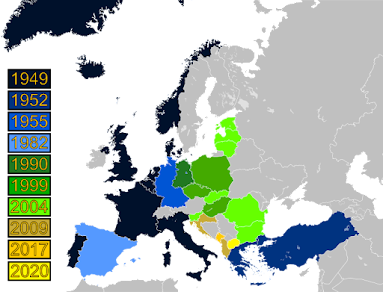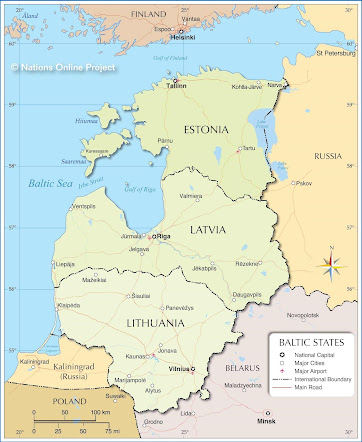Sunday, February 6, 2022
Well, the drums of war have been beating more loudly lately re Ukraine and people are predictably freaking out. But I think the Biden administration has been doing a good job of responding to a crisis that was by no means of its own making.
I think that part of the problem is that people have come to reflexively see Vladimir Putin as some kind of evil genius whose every move will inevitably bring success. That, and the idea that the US is somehow the aggressor in this dispute are the two weakest takes that I've encountered over the past month or so.
To begin with the second part first: the US isn't the aggressor here. Yes, NATO is an alliance that is conceived as primarily one that protects countries in Eastern Europe against Russian aggression. Guess what? Mainstream political elements in most of these countries believe in NATO because they see it as their best guarantee against threat-based intimidation from Moscow. NATO is fundamentally important for today's Europe because it helps to rein in Russia's leaders from acting upon their worst impulses.
NATO is, by the way, good for something else: keeping NATO's own members from acting on their worst impulses against one another. As I've remarked elsewhere, NATO's integrating influence also serves to lock a large number of former rivals into an alliance that without question stabilizes their mutual relations. While Greece and Turkey hardly constitute an example of perfectly friendly relations--they've come close to going to war with one another on several occasions since simultaneously joining NATO seventy years ago--conceivably the course of Greek-Turkish relations could have been much worse since then. One might even argue that it was precisely their mutual membership in NATO that prevented the two erstwhile enemies from going to war in the late 1950s, 1974, or in the various sea-based political conflicts they've been involved with more recently in the Aegean. So, when democratic countries in Eastern Europe have decisively chosen to join NATO, that's not a bad thing. It reflects both a genuine concern with their neighbor Russia, and a willingness to conclude a lasting peace with their neighbors and former rivals.
The conflict that is taking place between Russia and NATO is about NATO more than it is Ukraine. Moscow is threatening Kyiv in the interest of coming up with a broader security arrangement with the United States that would limit or even roll back NATO's expansion eastward since the 1990s. That's what this is about, to a great extent.
As for Putin: Russia isn't threatening Ukraine because Vladimir Putin thinks it would be a good idea to absorb Ukrainian territory into Russia. The point is to use threats against Ukraine as a means of freezing NATO expansion in the Balkans and ex-Soviet space, and maybe even garner some concessions regarding NATO's presence in the former Warsaw Pact countries of central and Eastern Europe.
And most of all, he wants to weaken NATO by testing it in this way. Putin would like to see splits within the alliance wherever possible: between Russian gas-dependent European members like Germany vis-a-vis the United States, as well as between Western European members and Eastern European ones--hence Moscow's suggestion that ex-Warsaw Pact states in NATO remain in the alliance but no longer host NATO troops from other countries. Another possible way of splitting the alliance would be between the Baltic states--all three of them former union republics in the USSR--and the rest of NATO, possibly through future negotiations with Russia seeking a special status regarding Estonia, Latvia, and Lithuania. Most of all, Putin is probably hoping for splits to emerge within NATO countries over the question of how to respond to Russia's provocations.
But Russia's Ukraine policy strikes me as a bungled one, at least so far. The main consequences so far have been a redoubled presence of NATO's soldiers on the alliance's eastern flank, increased fear/distrust of Russia among Moscow's neighbors, and the influx of weapons and money to Kyiv. No matter how undermanned Ukraine's military forces may be vis-a-vis Russia, they're likely better prepared for a conflict now than they were just a few months ago.
And I can't see how invading Ukraine benefits Russia in any way other than to prove a point. Eastern Ukraine, as I've argued elsewhere, is mainly beneficial to Russia as a threat. Holding a knife against Kyiv's jugular by supporting separatists in the east gives Russia bargaining power. But actually invading and occupying this relatively poor, heavy industry-laden region would be, as a best case scenario, a total pain in the ass. And this is probably the most pro-Russian part of Ukraine. What about western Ukraine? Would Moscow actually try to hold that region? It all sounds very messy to me.
*
If Russia actually does invade, it will mainly be in order to carry out a threat in order to not look weak, which is probably one of the worst, most feckless ways in which one country could go to war against another. A best-case scenario for the Kremlin would be Russia getting hit with a bunch of new sanctions, occupying some new territory that hardly any other country would recognize as part of Russia, and the whole thing quieting down after some time. A more likely scenario would be a protracted military conflict on Russia's doorstep, something that could end up being destabilizing for Russia itself.
That's why I've been describing Putin's approach so far to Ukraine as one of "hold me back!!!!", because it strikes me as a pretty obvious bluff. But even a bluff can end up coming true, especially if you make a threat enough times that you feel like you're starting to lose credibility. And that might be why a bunch of people end up dying or having their lives overturned: so that someone in Moscow can maintain his credibility.
And that's what we call bungling toward Kyiv.
*
Personally, I'm against offering NATO membership to Ukraine, at least right now. Even before Russia began massing troops on Ukraine's borders, and even before Russia's annexation of the Crimea in 2014 and its creation/support/encouragement of rebellion in eastern Ukraine, I thought it was a bad idea to offer membership to a country where it's such a divisive issue. There should be substantial support within a country for its joining a military alliance, especially when the neighborhood-related consequences can be so far-reaching. I think NATO is right to send weapons and other supplies to Kyiv, but stationing NATO troops in Ukraine would be a terrible idea right now.
But the even larger issue, as far as Russia is concerned, is NATO. I'm glad to see that the Biden administration, at least so far, has not 'gotten wobbly' in the face of Moscow's threats and bluster. Russia's early demands of NATO, offered in mid-January, were really over the top. Their only value, presumably, was to pave the ground for Putin to look more statesmanlike when the Kremlin returns with more reasonable-sounding offers.
I've read a lot of thoughtful commentary, such as here, suggesting that the US rule out Ukrainian membership in NATO as a means of making diplomacy with Russia. The real world, after all, is one that involves spheres of influence. The US has the Monroe Doctrine. And wouldn't Americans be upset if Canada, Mexico, and most of Latin America were signatories to a military alliance with Russia?
Sure we would. But it's also worth asking why these countries aren't rushing to find protection under Russia's umbrella. Is it because of the Monroe Doctrine, or is it due to the fact that the populations of none of our neighbors would ever be considered likely to show any interest in such a thing? The only countries that are, in fact, ever brought up in these conversations are Cuba and Venezuela, two undemocratic states where public opinion plays relatively little role in state policy formation.
While I don't foresee a time when I think it would be a good idea to offer NATO membership to Ukraine, I also think that formally renouncing such a move in the face of Moscow's aggressive behavior would really send the wrong signal.
Renouncing Ukrainian NATO membership won't make problems with Russia go away because Moscow is more concerned with NATO than Ukraine itself. The real problem, as far as Moscow is concerned, is western influence--NATO or EU--in Moscow's neighborhood, rather than in Ukraine per se. If the US were to renounce offering membership to Ukraine, we would, I think, just end up watching a similar show of force from Moscow in relation to the Baltic states a couple of years from now.
Speaking of the Baltic states: 90% of population of the Estonian city of Narva is ethnically Russian. Narva, moreover, is an important city in Russian history, the site where Charles XII of Sweden ceded to Russia the territory that would eventually include St. Petersburg. What if a group of local ethnic Russians were to demand annexation to Russia and Russia were to ask for Narva's transfer as a means of testing NATO's resolve? Or what if Moscow were to ask for a land route between Russia and Kaliningrad? If we "just give Russia what they want" right now in Ukraine and formally drop the idea of NATO membership, the conversation will, I think, shift westward relatively soon.
There's a good chance that Putin is taking the long view, hoping that Republican victories in 2022 and 2024 will constitute a rejection of the Democrats' pro-NATO stance. The Republicans used to be pro-NATO as well, but their party is now under the control of someone who reportedly planned to withdraw the US from NATO following re-election. So, the reasoning here could be: rattle Kyiv's cage, hope the GOP continues to follow DJT's isolationism re NATO, and then take a Democratic defeat in 2024 as a sign to 'restart' talks on freezing/rolling back NATO. The next American president, meanwhile, could seize upon the opportunity to be a hero by making a deal with Moscow regarding NATO more generally.
Stranger things have happened. Who knows? Maybe we're all bungling toward Kyiv these days.
***
Also see:
The Monroe Doctrine, Putin, and Post-Soviet Space: Don't Muddy the Waters
Crimea River: Water and Russian-Ukrainian Relations
The Not-So-Great Game: The US and Russia in Post-Soviet Space
Bad Idea Jeans: Ukraine Edition
Crimea and eastern Ukraine: Things Can Always Get Worse
Tough Options
Russia and the Politics of Citizenship
The Crimea: More Than Just a War
Trouble in Ukraine
***
More commentary, photos, and links can be found in the Borderlands Lounge.






No comments:
Post a Comment